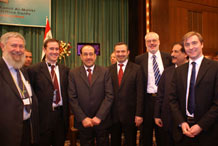
From L-R: Professor Gordon Campbell, Stuart Scott (British Council Baghdad), Nouri al Maliki (Prime Minister of Iraq), Ali Hadawi, Dr John Withrington, Dr Abid Diab Al Ajeely (Iraqi Minister of Higher Education), Dr Shaun Curtis.
Rebuilding higher education in Iraq
Expertise from the University of Exeter is helping rebuild higher education in Iraq.
In a recent visit to Baghdad, Dr John Withrington, Chair of the British Universities Iraq Consortium (BUIC) and Exeter’s Dean of International Development, met British Council and senior Iraqi Government officials to discuss the Prime Minister’s Education Initiative.
$1 billion has been earmarked for this ambitious overseas scholarship programme, and John met Iraqi Prime Minister Nouri Al-Maliki at the launch.
The Higher Education system in Iraq has suffered in two decades of war and sanctions. More than 80% of the country’s university infrastructure was destroyed in the second Gulf war, and many academics have fled.
John joined a high profile group, including Sion Simon MP, Minister for Further Education; Prof Gordon Campbell from the University of Leicester and founding chair of BUIC; Dr Shaun Curtis from Universities UK and representatives from the British Council. Meetings were also held with Dr Abid Diab Al Ajeely, Iraq’s Higher Education Minister.
The Iraqi government hopes to send more than 10,000 students a year for overseas study in English- speaking countries, with the UK and US set to receive the largest share. BUIC and the British Council are working closely together to help capacity building of the Higher Education sector in Iraq. The delegation met hundreds of students and gave advice on issues ranging from visas and entry requirements to English language testing.
John Withrington says: “The UK has the opportunity to contribute to the restoration and reshaping of higher education in Iraq. Our engagement with Prime Minister Nouri Al-Maliki’s visionary Education Initiative has the backing of the British Government. This is a clear statement to all Iraqis of the UK’s desire to move from a relationship dominated by military and security affairs, to a more normalised bilateral relationship bringing education and cultural relations to the fore.”
The Institute of Arab and Islamic Studies at the University of Exeter specialises in the study of the cultures, history, politics, societies, and economies of the Middle East and the wider world of Islam, and in Arabic, Persian and Kurdish language and literature. Exeter is the only British university to have developed a strong research focus in the field of Kurdish Studies. In addition, the University has a representative office in the Middle East, based in Dubai. It works to expand the University’s business activities and strengthen links in the region.
Date: 11 February 2009
